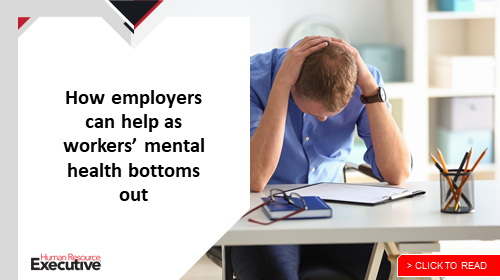Along with the post-pandemic Great Resignation, companies are discovering that their remaining staff are undergoing another crisis: the Great Burnout.
The stress of the pandemic has taken a high toll on many staff members, and HR staff have been taxed in a very particular way. The tasks they were burdened with during the pandemic are those that nobody else in the company would want to have to shoulder, such as being the bearer of bad news with pandemic-related layoffs. Additionally, HR staff were often responsible for coordinating the move of a company’s teams to online, creating ad hoc guidelines to maintain productivity in an untested work scenario. They were further tasked with having to stay up-to-date with continually shifting employee vaccination mandates and safety requirements as well as enforcing these guidelines in the workplace. Most recently, amid the Great Resignation, HR departments are squeezing the shrinking candidate pool to try to fill vacancies to keep their companies afloat.
Last but not least, in many instances, the burden has fallen on HR staff to be the emotional support for other staff, without having the resources or training to play that role and without the ability to seek similar support when they needed it. The stress of having to perform so many tasks for which they were not trained—not to mention having the emotional buck stop with them during such a chaotic time—has led to a sweeping case of burnout across HR departments.
The results of these stressful times are clear, as a report by Workvivo published in Forbes revealed that a full 98% of HR staff report feeling burned out. There’s more:
- 88% say they dread work
- 97% say their work has caused them to feel emotionally fatigued
- 73% say they don’t have the tools and resources to do their job well
- Only 29% feel that their work is valued by their company
Given all this, it’s unsurprising that 78% of HR professionals would consider leaving their job for another opportunity.
In such a scenario, companies need to recognize that their HR staff are vulnerable—not only to leaving the company, but to falling prey to the myriad problems associated with long-term elevated stress such as insomnia, high blood pressure, anxiety and depression. Leaders can look for burnout signs among their HR staff, including lateness with deliverables, reduced performance, negative change in humor, lack of responsiveness and communication.
Darcy Gruttadaro, director of Center for Workplace Mental Health at the American Psychiatric Association Foundation, says that “there’s an increasing recognition that organizations need to do more.” Gillian French, employee experience expert at Workvivo told Forbes that, “Significant attention and focus is needed on the people function, as well as investment in the employee experience for all … Organizations must examine their culture and truly listen to their employees about what needs to change.”
In the face of an HR department crisis, what can companies do to support, empower and retain their HR staff?
- Give them a seat at the table. HR staff have the worst of both worlds in that they are forced to shoulder many of the toughest tasks in an organization but have no voice when it comes to designing policies or making decisions that will affect them. French observed that, “One thing I’ve noticed during my working life is that people who have a background in HR rarely make an appearance on company boards.” By opening the door to them to sit in on executive meetings, organizations get to understand their reality, hear their insights and hopefully formulate better policies that are anchored in HR support. Likewise, HR staff will feel valued, be more invested in working hard under policies they co-created and are more likely to stick around.

- Incorporate wellness trainings. Wellness programs work when they’re done right. In fact, 48% of employees report that company-sponsored wellness programs are the No. 1 factor in helping them manage stress according to an Udemy study. They also improve overall health and job satisfaction.
- Offer flexible hours and the ability to work from home. Though the pandemic appears to be in its waning stages, life continues to be chaotic for many households, and giving employees the flexibility to choose their work hours rather than establishing preset work days and times that might not be ideal for them can help alleviate stress and enhance productivity. Likewise, giving employees the choice to work from home, at least part of the time, can help reduce work-related stress.
What can HR employees do to alleviate stress?
Unfortunately, not every organization is going to respond adequately to the HR crisis and HR staff will be left to seek resources that help them combat burnout on their own.
HR staff who are facing burnout need to change tack before the situation worsens. Burnout can have very serious effects on physical and mental health.
Look out for the following signs that you are experiencing burnout:
- Sense of failure, defeat and helplessness
- Feeling alone and without support
- Lack of motivation
- Inability to feel satisfaction or sense of accomplishment
- Increased negativity
- Constantly feeling tired
- Insomnia or oversleeping
- Feeling increased levels of anxiety
- Feeling depressed
Some practices that HR professionals can begin to incorporate into their routines are:
- “Delegate aggressively,” as head of HR for the U.S. division of the streaming platform Agora, Sharon Kittredje says. Being able to rely on her team members and realizing that she doesn’t have to do it all herself has helped alleviate workplace stress.
- Ask for help. It’s often a badge of honor among HR professionals that people come to them for help and not the other way around. But reaching out to superiors to let them know you’re struggling with your workload or feeling overwhelmed is an important step in finding a solution.
- Incorporate wellness practices such as mindfulness, meditation and yoga into your routine.
- Get enough sleep. Lack of sleep has serious effects on productivity, mood and health.
- Eat a healthy diet. Foods high in saturated fat and sodium, caffeine, sugar and alcohol can have negative effects on mood, energy levels and sleep. Eating a balanced diet can help improve mental and physical wellbeing.
- Get some exercise. Exercise stimulates the production of the positive hormones responsible for feelings of wellness, satisfaction and happiness and strengthens the immune system. Find a physical activity you enjoy doing, whether it’s walking, jogging, tennis, working out at the gym, yoga or another sport. Extra wellness points for activities that give you some fresh air. Charlotte Kackley, HR Rep for SHRM-SCP says that “Going on a walk helps me reset. I look up and all around me to take in my surroundings, and I’m reminded of so many things that make me smile or offer inspiration.”
Looking ahead
The HR crisis is yet another casualty of the pandemic, but also offers an opportunity for organizations to rethink their values and the way their work environment and policies affect their employees. Becoming a people-first organization has a lot of benefits in terms of long-term retention of employees in an environment that values health and wellbeing. This also helps to boost the attractiveness of an organization during a time when it’s a job seeker’s market. As one of the purported causes of the Great Resignation is a shift in values on the part of employees who are seeking a more balanced lifestyle, this cultural shift is inevitable anyway. Organizations that lead this change will soon see others following suit.

